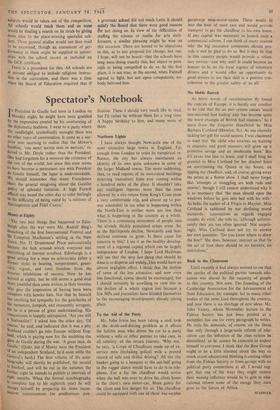Monty at Eighty The two best things that happened to
Edin- burgh after the war were Mr. Rudolf Bing's launching of the first International Festival and Compton Mackenzie's settling in the New
own. No, 31 Drummond Place automatically became the hub around which everyone and everything of interest revolved. Edinburgh is a good setting for a man so aristocratic (after a former style) in bearing, temperament, gener- osity, vigour, and total freedom from the drearier inhibitions of success. Now he has arrived at eighty, but he still seems a good deal more youthful than some writers in their twenties Who give the impression of having been born complete with bowler hats. Not that he himself has anything but sympathy for the gaucheries of the immature, lumpish, and innocently arrogant, for he is a person of great understanding. His romanticism is happily unimpaired. 'Are you still a Nationalist?' I asked him the other day. 'Of course,' he said, and indicated that it was a pity Scotland couldn't go into Europe without Eng- land, which is paying now for the snubbing she gave de Gaulle during the war. 'A great man, de Gaulle.' (Quite, but if Monty were the President of an independent Scotland, he'd soon settle the General's hash.) The first volume of his auto- biography will shortly be published; the second Is finished, and will be out in the autumn; the further eight he intends to publish at intervals of eight months. When the formal autobiography Is complete (up to his eightieth year) he will °ccoPy himself by preparing his more incon- venient reminiscences for posthumous pub-
lication. These 1 should very much like to read, but I'd rather be without them for a long time. A happy birthday to him, and many more of them.






























 Previous page
Previous page